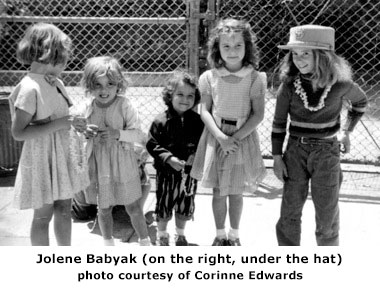THE ALCATRAZ INTERVIEWS
Daughter of the Acting Warden During the Most Famous Escape
Jolene Babyak lived on the Rock in 1954–1955 and also 1962. Her father was acting warden when Warden Blackwell was on vacation, which happened during the most famous escape attempt on Alcatraz. She is a premiere Alcatraz author and historian.

1.
How did it feel to be the Associate Warden’s daughter?
My dad was just my dad. I was pretty unconscious at the age of 15. I was just trying to figure out who I was. If anything it might have embarrassed me a little bit.
2.
Did you feel more responsible because you were the warden’s daughter?
No.
3.
Did you get special treatment?
The only thing I remember happening was once I missed the boat and the pilot, Pat Mahoney, turned the boat around to go back and get me. It was just a little turnaround but it was embarrassing at the time. Later I wondered if it was because I was the A.W.’s daughter. But he assured me that it was because he liked me!
4.
Any downside to being the Warden’s daughter?
There was a girl on the island who I thought didn’t like me because it was rumored that her dad had been up for the job. But my father got the promotion instead.
5.
Are you the person who determined which was Al Capone’s cell? And if so, how were you able to document this?
John Martini and I worked on this together. There were three different numbering systems on the cells. When Al Capone came to Alcatraz the original numbering system was in place. By creating a grid of all three numbering systems we were able to determine which was Al Capone’s cell. (Cell #181).
6.
Given the mythology around Alcatraz, what are some of the guidelines you use to determine fact from fiction?
I only use primary sources and documents. I read books and newspapers for color (quotes, attitude) but generally not for facts.
7.
What are some of the most surprising facts you’ve discovered about Alcatraz?
The size of the cells. (5’x 9’). I was shocked by how small they were. Also, I was surprised by how collegial some of the prisoners and the guards were. You can’t work in an environment that is hateful all the time. People found the humanity where they could.
8.
Were there ever any kids on the island who you thought shouldn’t be there?
No, if you got in trouble, your dad got in trouble and then you’d be in trouble when you got home too.
9.
In your book, Eyewitness on Alcatraz, you talk about getting a hand ball from a prisoner. You said “It was a proud moment; I had in my hand the most valuable item on Alcatraz — the coveted black handball that had rolled down the hill from the prison yard wall.” One of the questions kids always ask me, is what happened to that ball? They want to know if it’s on eBAY or what?
I don’t have that exact handball. But I was fortunate enough to be the recipient of another handball, also from a prisoner on Alcatraz. That one I still have.
10.
You were living on the island during the 1962 Morris-Anglin escape; can you tell me what that felt like?
The escape was fun. If it had been two a.m. and there had been guns it would have been scary, but we found out at seven a.m. It was broad daylight. My mother came in and I could tell by her voice she was excited, because life would be different that day. We had to go into the cellar and I grabbed a paring knife. That part was a little scary. My mother made me go first.
11.
Why?
Because I had the paring knife.
12.
As an Alcatraz historian who has spent the better part of her life researching Alcatraz, is it your opinion that the men in the 1962 escape attempt, (the Anglin brothers and Frank Morris) drowned or do you think they made it?
The Anglin brothers were show-offs; it would have been impossible for them to hide out without telling anyone. (There’s no fun in that.)
Morris was quiet, but he had no relatives and few resources. They weren’t like James “Whitey” Bulger, who also spent time on the Rock. Years later, Bulger landed on the Ten Most Wanted list for almost two decades before he was caught in 2011. When found, he had stashed more than $800,000 in cash in his apartment. That’s after not working for two decades! Morris and the Anglins were small-time criminals with no money except what they could steal.
Jolene Babyak has published numerous books on Alcatraz including: Eyewitness on Alcatraz; Breaking the Rock, the Great Escape from Alcatraz; and Birdman: The Many Faces of Robert Stroud. She has interviewed scores of former residents, prisoners and guards, reviewed hundreds of Alcatraz files, and is currently working on another book about life on Alcatraz.
Interviewed by Gennifer Choldenko in Berkeley, California, on July 10, 2013

